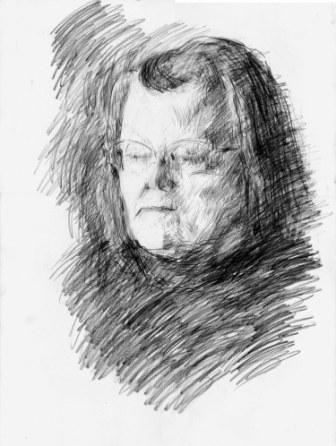One of the many things that perplex me is the content of contemporary popular music. Clearly this is much beloved of everyone born after World War II. In the past I was able to understand and appreciate some of it, but I am totally baffled by the latest music. I search for melody and find none. I listen to the lyrics, and if I can make them out, they are still incomprehensible. Why is this? Is my brain so set in its ways, so adverse to new things that I can no longer appreciate the new?
I was sitting in church with a good friend, my age, when I noted in the bulletin that we were going to sing, “Come in, come in and sit down, you are part of the family.” I was quite tickled because I know how much he dislikes the hymn. I try to be open-minded about these new hymns, but oh how I miss the old ones. On the rare occasion when we do sing one of these old ones, I will often find tears appearing in my eyes.
When our son got married, our daughter-in-law had a lovely thought. Because my father couldn’t be there, we would sing his favorite hymn, "Immortal Love", by John Greenleaf Whittier. “We may not climb the heavenly steeps to bring the Lord Christ down.” She photocopied the words and music for the guests, but the organist played an unfamiliar tune that my brother and I couldn’t sing, a terrible disappointment. I then realized how much the tune and the words belonged together.
Often before the organ prelude Irma Brewer would play a few of the old hymns on the piano. Last week she died, and a week from Sunday, in her memory, we are going to have a hymn sing an hour before the regular service. I wouldn’t miss it for the world.
Wednesday, October 25, 2006
Subscribe to:
Post Comments (Atom)

3 comments:
The old hymns came to you when you were much younger, as they did to me and people 50+ in age. Naturally, we'll respond to them emotionally, and why not?
At the same time, the old hymns aren't coming to younger people at all, because the language and the musical sensibility might as well be Martian as these hymns simply don't communicate to them (any more than the liturgy does, either, while we're at it). So I welcome the newer ones because they communicate to younger people, and because they hopefully bring different musical sensibilities to worship.
As a church musician, I would add something you probably know already: the metrics of each lyric and tune are meant to be (more or less) interchangeable with other tunes/texts that have the same metric. E.g: a tune in 8888 may be used with any text that has that same metric.
Sometimes, changing from familiar tunes wakes us up to what we're actually singing, instead of allowing us to go on automatic pilot. And that isn't a bad thing...
Singing Sacred Harp, I hear old tunes to new words, and familiar words to new, or different tunes. Some better, some jarring.
"Oh, unscrupulous modifiers of folk songs!"
- Pete Seager.
Those of us in the older generation are sometimes made to feel as though our preference for the traditional hymnody of the church is one of the afflictions of advancing age. And the younger generation is systematically brainwashed to believe that, "You couldn't possibly understand that old, outdated stuff. You need something contemporary, your kind of music."
One wonders if we must therefore discard Shakespeare, and Dickens and the rest for the same reason! No! There is an alternative. Rather than capitulate, let's educate. With a bit of effort, it is possible for us to expand our vocabulary of worship.
I've heard it all many times. For years I taught a philosophy of sacred music to young people, in a college classroom. (The low point was perhaps this profound thought from a student: "If it ain't got drums and guitars, I ain't interested.")
It is certainly not true that a song is invariably better because it is older. But neither must we discard our heritage in English hymnody because a text was written a century or more ago. The best work of Watts and Wesley and Newton and the rest is light years ahead of almost anything produced today.
Furthermore, the promotion of contemporary religious music not purely a ministry, it is big business. The appeal this billion-dollar industry aims at our youth is not always spiritual and altruistic. Even some of the more honest contemporary musicians have admitted that.
On a bit different subject, your comment on the tunes that are used is also insightful. As a long time song leader who has conducted many community hymn sings, I quickly learned that quite a few people like a "favourite hymn" because of the traditional tune. Sometimes, changing the tune can give fresh insight into the lyrics, but this must not be done too often.
Well, I could ramble on at greater length, but I'll stop here. I appreciated your comments. drop in to my daily blog Wordwise Hymns. I think you'll enjoy it.
Post a Comment